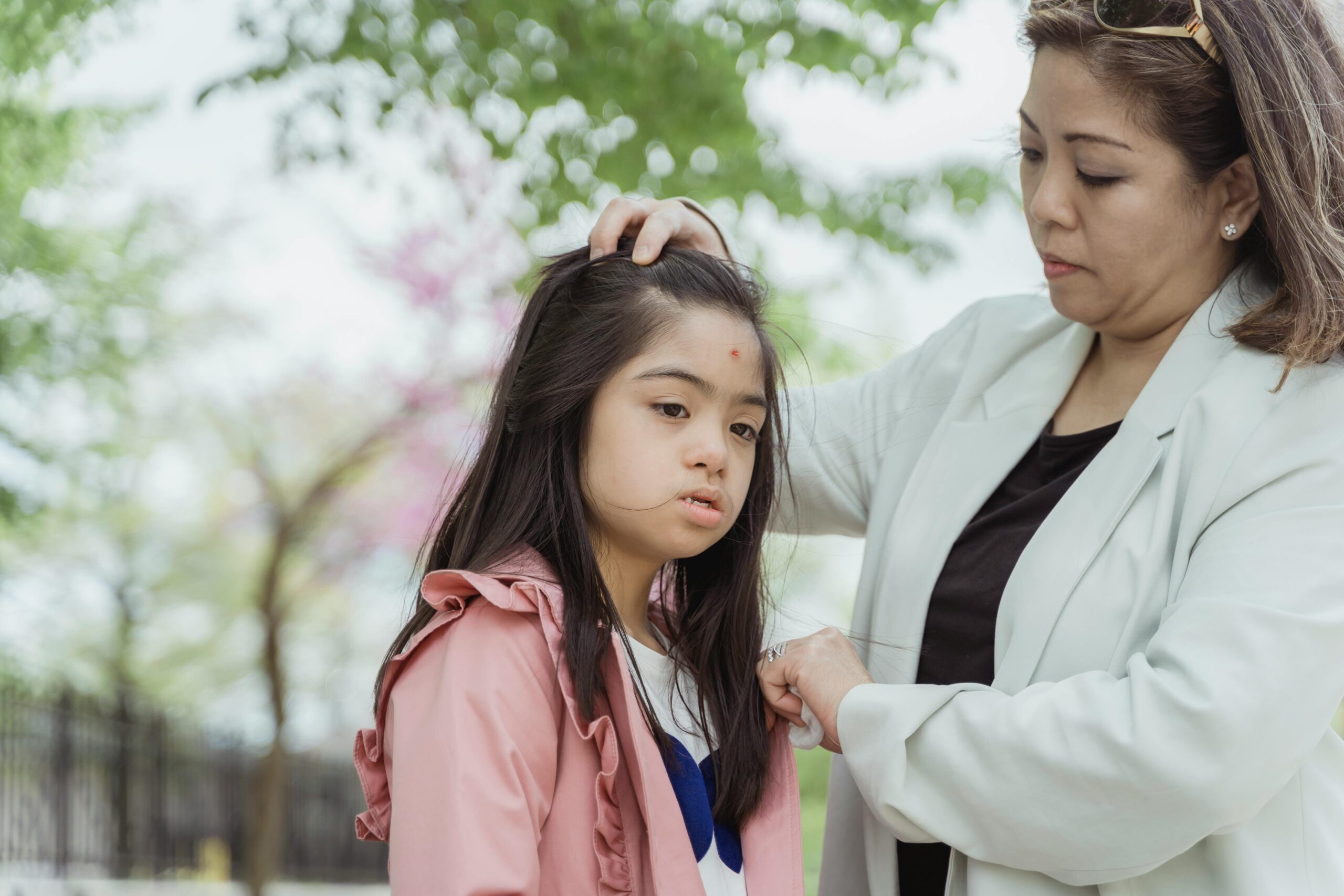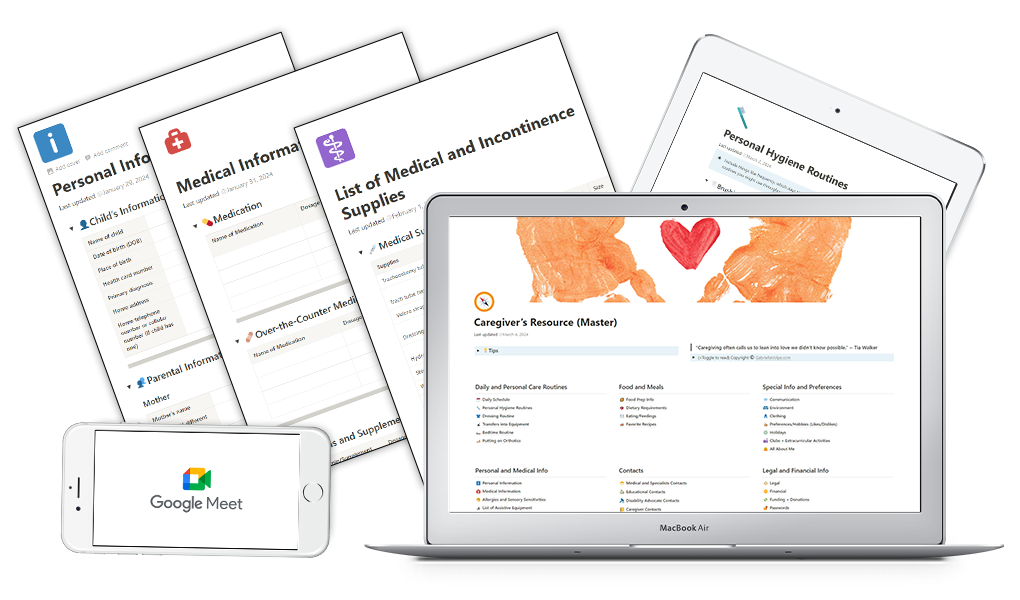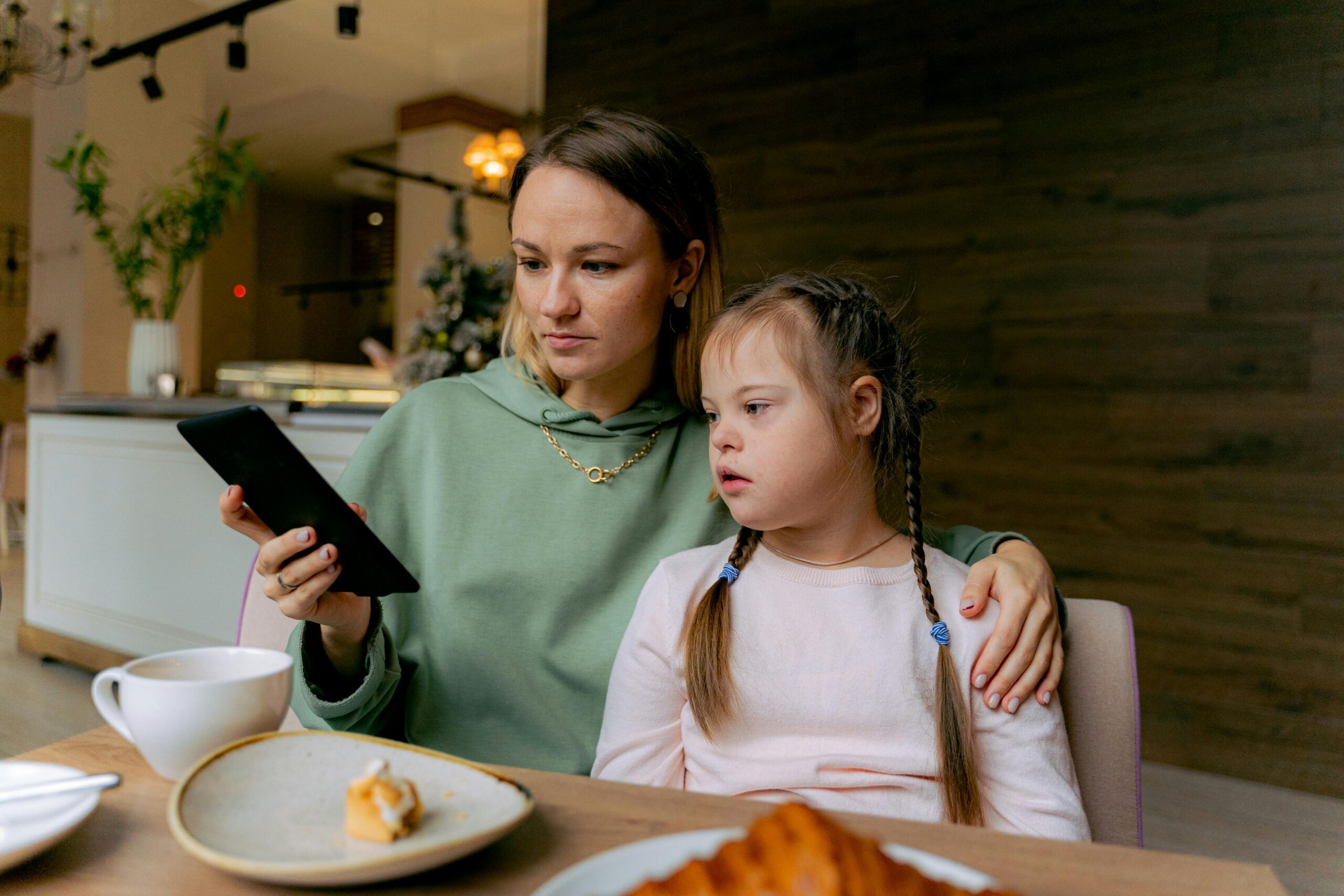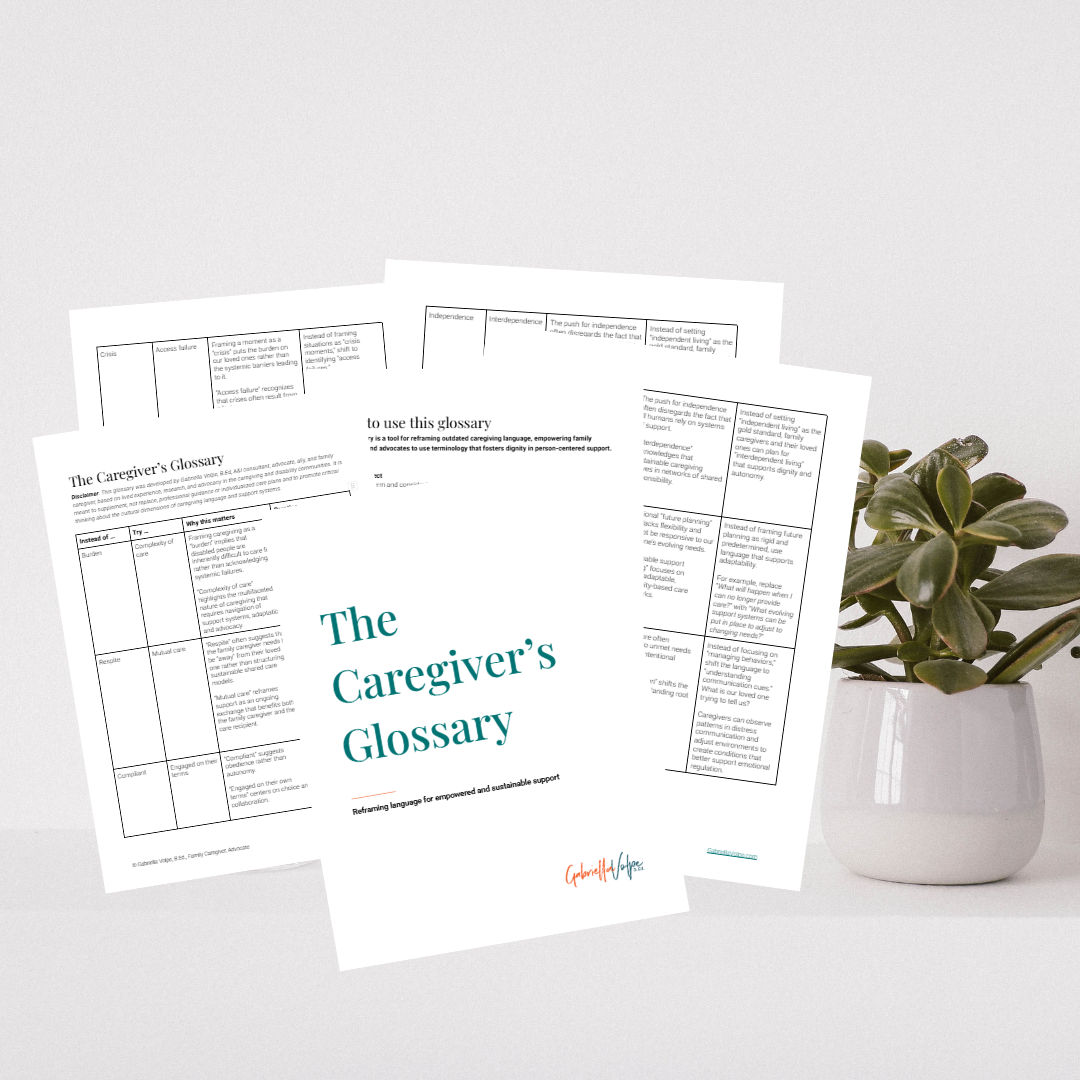Reframing Language for Empowered Support
Why This Glossary Matters
For far too long, caregiving language has been dictated by medical, educational, and social systems that fail to reflect the lived experiences of caregivers and, most importantly, their loved ones. Words like “burden” and “non-compliant” shape perceptions. They reinforce outdated models that place all responsibility on caregivers while ignoring systemic failures.
As a solo parent and advocate, I’ve encountered the immense weight of these misrepresentations firsthand. The language we use has the power to either limit or liberate us. When we change terminology, we shift expectations and empower caregivers to demand better support structures (rather than fix ourselves or our loved ones).
Note: Get the FREE downloadable version of this glossary at the end of this post.
The language we use has the power to either limit or liberate us.

Caregiver’s Glossary
1. Instead of “Burden” → “Complexity of care”
Standard definition: A weight or heavy responsibility placed on a caregiver.
Framing caregiving as a “burden” implies that disabled people are inherently difficult to care for rather than acknowledging systemic failures. “Complexity of care” highlights the multifaceted nature of caregiving that requires navigation of support systems, adaptation, and advocacy.
Shift conversations from “Caregiving is a burden” to “Our family needs support with the complexity of care.”
2. Instead of “Respite” → “Mutual care”
Standard definition: A temporary break for caregivers.
“Respite” often suggests that the family caregiver needs to be “away” from their loved one rather than structuring sustainable shared care models. “Mutual care” reframes support as an ongoing exchange that benefits both the family caregiver and the care recipient.
Instead of seeking “respite” in isolation, a family caregiver might build a system where trusted community members engage in caregiving while they engage in restorative activities. The family caregiver might also participate in the care along with the secondary care provider(s).
3. Instead of “Independence” → “Interdependence”
Standard definition: Self-sufficiency without reliance on others.
The push for independence often disregards the fact that all humans rely on systems of support. “Interdependence” acknowledges that sustainable caregiving thrives in networks of shared responsibility.
Instead of setting “independent living” as the gold standard, family caregivers and their loved ones can plan for “interdependent living” that supports dignity and autonomy.
4. Instead of “Future planning” → “Support mapping”
Standard definition: Preparing for long-term care needs.
Traditional “future planning” often lacks flexibility and may not be responsive to our loved one’s evolving needs. “Sustainable support mapping” focuses on building adaptable, community-based care frameworks.
Instead of framing future planning as rigid and predetermined, use language that supports adaptability. For example, replace “What will happen when I can no longer provide care?” with “What evolving support systems can be put in place to adjust to changing needs?”

5. Instead of “Compliant” → “Engaged on their own terms”
Standard Definition: Following prescribed instructions without resistance.
“Compliant” suggests obedience rather than autonomy. “Engaged on their own terms” centers on choice and collaboration.
Instead of labeling a child as “non-compliant,” assess whether communication methods are accessible and adapt approaches to foster engagement based on their needs.
Instead of compliance, let’s talk about engagement on the person’s terms. True care is built on collaboration, not coercion.

Caregiver’s Resource Planning Group
Organize your caregiving records for your neurodivergent/disabled child with the accountability of a group. For family caregivers.
6. Instead of “Challenging behavior” → “Communication”
Standard definition: Actions that disrupt expected routines.
Behaviors are often responses to unmet needs rather than intentional defiance. “Communication” shifts the focus to understanding root causes.
Instead of focusing on “managing behaviors,” shift the language to “understanding communication cues.” What is our loved one trying to tell us? Caregivers can observe patterns in distress communication and adjust environments to create conditions that better support emotional regulation.
7. Instead of “Crisis” → “Access failure”
Standard definition: A severe or urgent situation.
Framing a moment as a “crisis” puts the burden on our loved ones rather than the systemic barriers leading to it. “Access failure” recognizes that crises often result from a lack of timely and appropriate supports.
Instead of framing situations as “crisis moments,” shift to identifying “access failures.” Caregivers can document these moments and analyze whether they result from systemic gaps, such as lack of accessible resources or inadequate support structures, and then advocate accordingly.
Crisis isn’t an individual failure; it’s an access failure. When systems don’t meet people’s needs, we must shift the focus from blaming individuals to fixing gaps.

8. Instead of “Caregiver guilt” → “System-induced guilt”
Standard definition: A sense of inadequacy about not “doing enough.”
Caregivers are made to feel guilty when they cannot compensate for systemic shortcomings. “System-induced guilt” places responsibility where it belongs—on inadequate policies and resources.
Shift the conversation from “I should be doing more” to “What external supports can be put in place to share this responsibility?”
Caregiver guilt isn’t a personal failing—it’s system-induced. We must ask not what more can I do, but what supports should be in place?
9. Instead of “Quality of life” → “Self-defined well-being”
Standard definition: External evaluations and ideas of how “livable” a person’s life is.
These assessments often ignore the perspectives of disabled persons themselves. “Self-defined well-being” prioritizes the perspectives of disabled people and their families.
Ask, “What does well-being look like for you and your loved one, outside of societal assumptions?” and use this perspective to guide care decisions.
10. Instead of “Self-Care” → “Supported well-being”
Standard definition: Personal activities meant to maintain health and stress levels.
Self-care often assumes individual responsibility rather than collective solutions. “Supported well-being” acknowledges that family caregivers need external structures to truly sustain themselves.
Instead of asking, “What breaks can I take?” reframe it as “What sustainable, external supports can be built into my caregiving ecosystem to prevent burnout and ensure long-term well-being?” This shift encourages proactive planning and interdependent support systems.
The power of language in caregiving
Language is more than words. It’s a framework for how we understand and engage with the world. When we shift how we talk about caregiving, we change how it is valued, supported, and experienced.
Caregiving is not an individual burden but a collective responsibility that should be met with systemic support and interdependent solutions.
By integrating these terms into your conversations, advocacy efforts, and everyday interactions, you can play a role in transforming caregiving culture.
Disclaimer: This glossary was developed by Gabriella Volpe, B.Ed., educator, A&I consultant, and family caregiver, based on lived experience, research, and advocacy in the caregiving and disability communities. It is meant to supplement, not replace, professional guidance or individualized care plans and to promote critical thinking about the cultural dimensions of caregiving language and support systems.
Resources
- The Arc – US-based advocacy and resources for individuals with intellectual and developmental disabilities
- National Alliance for Caregiving – US-based organization that translates the lived experience of family caregivers into policy, system, and culture change
- Canadian Centre for Caregiving Excellence – Supports caregivers and care providers across Canada, offering resources and advocacy initiatives
- Educaloi – Caregivers: Practical Legal Tools – Quebec-based reference in legal education and clear legal communication for caregivers
Related articles
The Caregiver’s Glossary – Free!
Reframing language for empowered and sustainable support.
Sign up to get a copy of the FREE Caregiver’s Glossary delivered straight to your inbox!

By signing up, I’ll also add you to my mailing list. You can unsubscribe at any time.

0 Comments